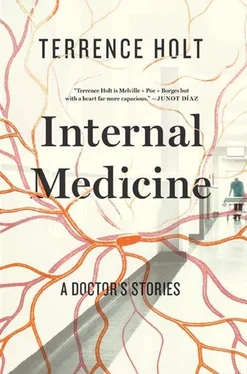Joe was walking at my side, head down, hands thrust in the pockets of his lab coat so his elbows stuck out behind him. He shook his head without looking up. The gesture made him look like a discouraged stork.
“Can’t do that anymore. Not from F-Max.” He glanced at me. “There was an incident.”
We had reached the front lobby. My dinner, the white cardboard box going a translucent brown along the edges, was sitting on the counter at reception. I scooped it up as we passed. The guard looked up from his screen, said, “It’s cold by now,” and pressed the button that let us out.
The night outside was loud with crickets and katydids, the humidity thick enough to scatter the glare of the sodium vapor lamps over everything. Objects stood out with a weird vividness, wearing halos in the streetlight. As we crossed the parking lot, a raft of palmetto bugs froze at our feet, then scattered madly in all directions. We watched them vanish. The slice of pizza I had been stuffing in my mouth had lost some of its savor. I gulped it down anyway.
“There’s a metaphor,” Joe said quietly.
This was not the kind of thing I usually hear from interns, even in psychiatry. I offered Joe the open pizza box. “A metaphor? For what?”
He shook his head. “Not sure.” We started walking again. As we turned out of the parking lot into the darker street, he said, “I think it’s for our relationship with this place.”
He gave me a sidelong, self-conscious glance. I had the sudden impression that Joe was shy.
“I think I need that one spelled out,” I said, I hoped kindly. The second slice of pizza was no improvement on the first. The guard had been right. And I kept thinking about the bugs as I chewed.
He hunched his stork shoulders and sighed. “You come onto a ward — like Acute Women’s — and there’s all this stuff going on.” He laughed. “Haven’t a clue what, but there’s a lot of it. And the minute we arrive, they all freeze, and whatever it was — the pattern of it? — breaks up. Just because we’re there.” He strode along a moment in silence. “We think we’re straightening these people out. But the moment we leave the ward, it all starts up again. Whatever it was. And we haven’t got a clue.” He sighed again. “You know?”
I had been so busy marveling at this moody, humane discourse that I almost missed the request for reassurance. “Yeah,” I said. “I think I know.” In the dark of the oak tree overhead, a bird awoke and screeched loudly, once. I looked up and shivered theatrically. “Now you’ve got me thinking it’s all a metaphor.”
He ignored the gesture, caught up in his idea. “Well, it is, isn’t it? Not the way the paranoids think: it’s not all about us. That’s the point. We’re nowhere near as central as we think. But all the same, there is this huge invisible order: but we have access to it only through the grace of God.”
Now it was my turn for a sidelong glance. He was gazing, his face rapt, into the lurid haze overhead. “We can’t see Him.” He said. “All our works just cloud the view.”
We walked the rest of the way to F-Max in silence. I found myself thinking irrelevantly about Carrie B. She seemed to have something to say about Joe’s view of the world, but just what exactly I couldn’t catch. The connection hovered just beyond my reach.
F-Max is the one part of the complex where our master keys do not work. We waited at the door several minutes under the gaze of a video camera until a guard appeared behind the thick glass and turned a key. We followed him meekly into the guard station, where under a bank of several dozen black-and-white monitors we emptied our pockets of keys, cell phones, wallets, spare change, pens — anything that met the definition of Contraband spelled out on a handwritten notice taped below one of the monitors. Pizza seemed to be contraband. I left the remainder for the guards.
Past four iron gates, at the top of the stairs our escort hung back and locked us in as we walked out onto the central corridor. The doors that lined both sides had little portholes of wire-reinforced glass, and no doorknobs. At the far end of the hall, half a dozen figures were standing about. None of them was with any of the others. They watched us as we approached. Another guard ushered us into the nursing station, where the door locked behind us.
“Doc!” the nurse cried. “How have you been? Haven’t seen you in weeks! You well?”
I smiled weakly. “Well enough, Lucy. You?”
“Oh, you know me, Doc.” Lucy levered her two hundred pounds out of her chair and lumbered across the cramped floor to the chart rack. “Not complaining.” She laughed abruptly, a harsh bray. “Not complaining.” She settled into another chair beside the rack. “Unlike some people I could mention,” she added. The chair creaked as she sat down, bent forward, and pulled a thick, battered binder from the rack. She pushed the chart in our direction and sniffed derisively.
“So? What’s the story?”
“It’s the same old bullshit.”
“I thought somebody said chest pain.” I opened the chart, flipped past the face sheet to the problem list.
She made a rude noise with her lips.
“Diabetes,” I read, pretending to ignore her. Joe stood nodding at my elbow as I ran down the list. “Smoker.” I had to squint at the next entry. “Hy Per Lip Id Emia.”
Lucy laughed. “Does it mention he’s a stone bastard?”
I pretended to scan the list.
“No. No, it doesn’t.”
“Here.” Lucy swiveled to another rack. “That’s ’cause you’ve got the wrong chart.”
The chart Lucy was pulling was his psych chart. She flipped it open, thumbed through a few pages, adjusted her glasses on the end of her nose.
“Ah. Here it is. Hmm-hmmhmm. Yeah. ‘Patient states that when he locked his children in the closet, he was unable to say what exactly was concerning him.’”
She looked up over the rims of her glasses to see if we were paying attention.
“ ‘He adds that the fire was necessary to prevent the spread of something he again is unable to identify, calling it at various times an infection, at other times a magnetic field. Even so, he states that he was aware while he was setting the fire that it would result in the death of his children. All three children died of smoke inhalation. The subject himself suffered third-degree burns to fifteen percent of his body surface area, mostly over the right side of his head and neck, apparently as he stayed within the building with his head against a wall until the wall collapsed.’”
She set the chart down. Her eyes were bright atop her chubby cheeks. “Chest pain, my ass.”
“Now, Lucy,” Joe said.
“Oh, Little Joe,” Lucy sighed, leaning back in her chair. She directed a stagy wink at me. “Little Joe wants everyone to get better.” She laughed, letting the sound trail off in a tired wheeze. “It’s almost June, for crying out loud. Aren’t you just about over that yet?”
Joe bit his lip and studied the chart. He turned a tabbed divider to a series of faded pink electrocardiograms. “This is from. two years ago. He was having an NSTEMI, I think. Yeah. Stents to the RCA and marginal oblique.” He flipped a page. “But even before that he’s got Q’s in III and AVF.” He turned the chart toward me. There were indeed Q waves in the inferior leads, evidence of an even earlier heart attack.
I turned back to Lucy. “Where is he?”
“Where do you want him?”
“How delusional is he?”
“Pshh. You want an escort?”
“Yes.”
“Gary! Docs want company!” She turned back to me. “He’s in the treatment room.” She turned away, the chair squealing, and pushed the blue binder back in its slot.
Читать дальше












